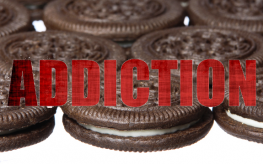Oreo Cookies Found to be as Addictive as Illegal Drugs…Again
Oreo Cookies Found to be as Addictive as Illegal Drugs…Again
You’ve heard it here before and you may have already heard the news about to come, but research just keeps piling on concluding that sugar and fatty foods are addictive.

“Our research supports the theory that high-fat/ high-sugar foods stimulate the brain in the same way that drugs do,” Schroeder said. “It may explain why some people can’t resist these foods despite the fact that they know they are bad for them.”
For the study, researchers gave Oreos to one group of rats on one side of a maize, and rice cakes to another group of rats on a different size of the same maize. Following, they allowed the rats to run to the other side of the maize without the food present, noting how long they spent on the opposite side. They repeated the process with another group of rats, only replaced Oreos with a morphine/cocaine injection and replaced rice cakes with saline.
“My research interests stemmed from a curiosity for studying human behavior and our motivations when it comes to food,” said Honohan. “We chose Oreos not only because they are America’s favorite cookie, and highly palatable to rats, but also because products containing high amounts of fat and sugar are heavily marketed in communities with lower socioeconomic statuses.”
Oreos Stimulate more ‘Pleasure Neurons’ than Addictive Drugs
Rats formed an equally strong association between the pleasurable effects of Oreos in a specific environment as they did between cocaine/morphine in a specific environment. They also found that eating Oreo cookies stimulated more neurons in the brain’s “pleasure center” than exposure to cocaine or morphine.
“This correlated well with our behavioral results and lends support to the hypothesis that high-fat/ high sugar foods can be thought of as addictive,” said Schroeder. Even though we associate significant health hazards in taking drugs like cocaine and morphine, high-fat/ high-sugar foods may present even more of a danger because of their accessibility and affordability,” she said.
Though this study does not concretely prove sugar is addicting, it certainly isn’t the first piece of research to come to such conclusions. Another studysimilarly found that the junk food plaguing grocery store shelves alters certain parts of your brain responsible for levels of hunger and thirst. And yet another study publishedin the Journal of Clinical Investigation shows that high-fat processed food consumption causes damage to the hypothalmus part of your brain, causing you to eat more of the food.
In other words, processed foods and junk foods are addictive.
| About Mike Barrett: | |
| Mike is the co-founder, editor, and researcher behind Natural Society. Studying the work of top natural health activists, and writing special reports for top 10 alternative health websites, Mike has written hundreds of articles and pages on how to obtain optimum wellness through natural health. | |
Other Popular Stories:
Get The NaturalSociety Natural Health Newsletter!
Post a Comment